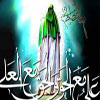
In one hadith, Amir al-Mu'minin ‘Ali (as) describes Mu‘awiyah and Abu Sufiyan in this way,
معاوية طليق ابن طليق، حزب من هذه الاحزاب، لم يزل لله عزّ وجلّ ولرسوله وللمسلمين عدوّاً هو وابوه حتى دخلا في الاسلام کارهين.
"Mu‘awiyah is unrestrained. He is the son of one who was unrestrained, and he is a party of this party. He and his father have always been enemies of Allah, the Holy Prophet (S) and the Muslims. This enmity continued until the time they were compelled under duress to become Muslims."20
In a letter addressed to Mu‘awiyah, Imam ‘Ali (as) writes, "O son of the ill-fated one! O son of the accursed one...'21 It seems that Amir al-Mu'minin ‘Ali (as) was referring here to the curses which the Holy Prophet (S) pronounced on Abu Sufiyan, his son Mu‘awiyah and his grandson Yazid.
It has been recounted that one day Abu Sufiyan was riding a horse and one of his offsprings (either Mu‘awiyah or Yazid) was in front and the other in back. When the Holy Prophet (S) saw them, he said,
«اللهم العن الراکب والقائد والسائق.»
"O Allah! Banish from your mercy the rider of this horse and those that are leading it."22
In another letter to Mu‘awiyah, Amir al-Mu'minin (as) writes,
«منّا النبي ومنکم المکذّب.»
"The Prophet (S) is from us, and the denier of his prophethood is from you."23
Commenting on this, Ibn Abi al-Hadid says, "Imam ‘Ali (as) was referring to Abu Sufiyan ibn Harb, because Abu Sufiyan was one of the Prophet's (S) most vicious enemies and a denier of his prophethood."
Addressing Mu‘awiyah, Imam al-Hasan al-Mujtaba (as) said,
وانّک يا معاوية! واباک مِن المؤلّفة قلوبهم، تسرّون الکفر، وتظهرون الاسلام، وتستمالون بالاموال.
"Without doubt, you, Mu‘awiyah, and your father, are among the people who have used money from the Islamic public treasury for the sake of pleasing your hearts. You have concealed your infidelity and unbelief [kufr] and instead displayed your false belief in Islam. You have lured people towards yourselves by means of your possessions."24
Notes:
20. Tarikh Tabari, vol. 5, p. 8, events of the year 37 AH.
21. Ibn Abi al-Hadid, Sharh Nahj al-Balaghah, vol. 15, p. 82.
22. Tarikh Tabari, vol. 10, p. 58, events of the year 284 AH.
23. Ibn Abi al-Hadid, Sharh Nahj al-Balaghah, vol. 15, p. 196.
24. Ibid., vol. 6, pp. 288-289.
source : www.rafed.net













